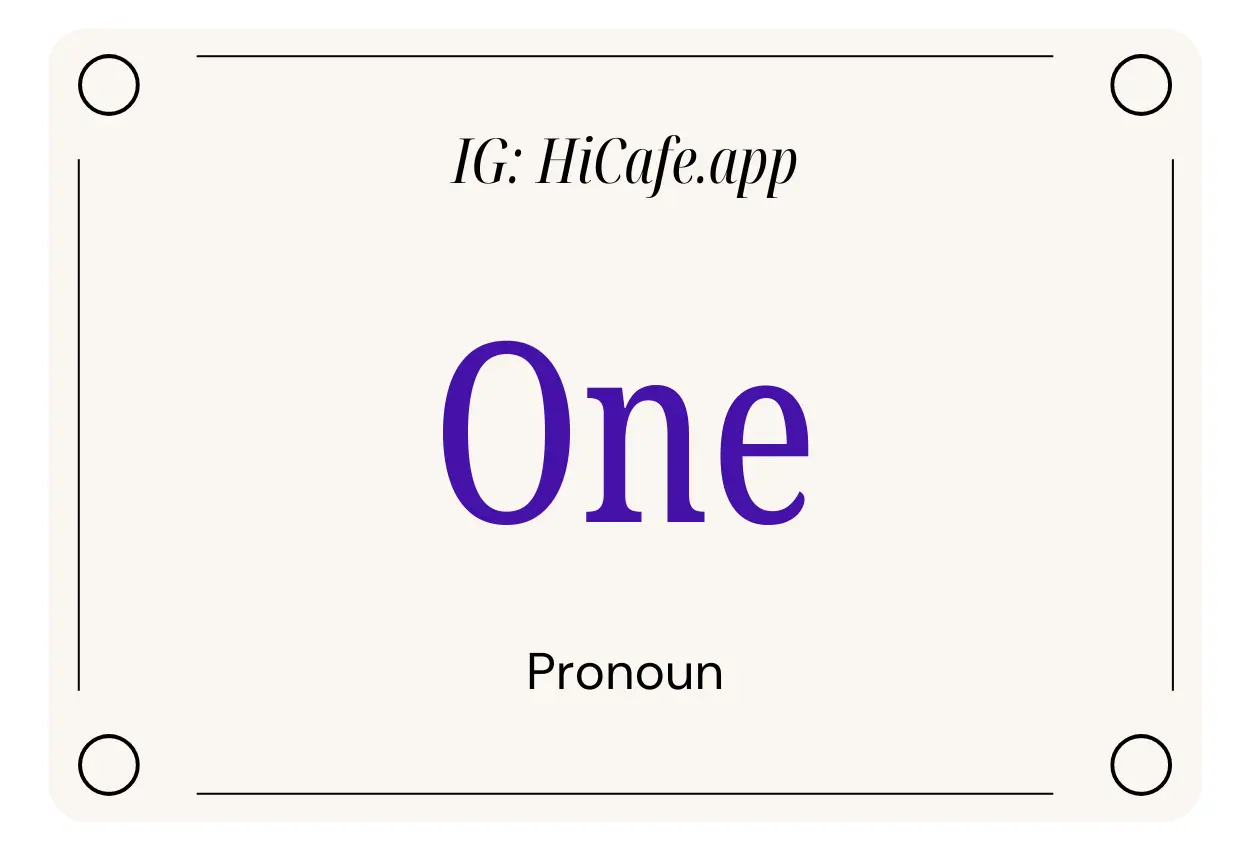Grammar Pronoun- Lesson Fifteen- Definition of Pronoun One
In this grammar lesson, you learn about definition of pronoun One in English and how to use it in your English conversation and writing. Just follow examples and write them down a few times to learn them very well. After finishing this lesson, you should work on its quiz.
Grammar Recap
In our previous lesson, we covered the No One Pronoun Definition If you just landed on this page, we suggest that you complete our previous lesson including its quizzes before continuing on this lesson.
Requirement Lessons
There is no required lessons for working and learning this lesson.
What Type of Pronoun is One
(indefinite pronouns)
singular
| subject | object | possessive adjective | possessive pronoun | reflexive pronoun |
|---|---|---|---|---|
|
one
|
one
|
one’s
|
—
|
oneself
|
Use “one” when you need a neutral pronoun (neither male nor female). The use of “one” is found in formal English, but in normal, everyday English, it’s not popular. Many Americans choose to use the pronoun “you” instead of “one” The pronoun “one” refers to “a person.”
subject = one
One needs to work to earn income.
A person needs to work to earn income.
You need to work to earn income.
one = a person
you = a person
object = one
The view of the Niagara Falls leaves one with a lasting impression.
possessive adjective = one’s
It’s one’s responsibility as a citizen to vote when there are elections.
possessive pronoun = 0
reflexive pronoun = oneself
One needs to remind oneself of what is really important in life, such as one’s children.
(This sounds a little too formal, but you might hear “oneself” used in this way.)
Remember:
1. The use of “one” is very formal. It’s rarely used in spoken English, but it’s useful in written English. In any case, most people choose not to use it.
2. The word “one” is also a noun. It can be used for a person or a thing. The plural form of “one” is “ones.” This is not the same as the pronoun “one.”
3. It’s possible to use “one” as an adjective. In the expression, “They’re one and the same,” the speaker wants to indicate that two people or two groups are very similar. This word also goes before words like “people,” “nation,” “purpose,” “world,” etc., to emphasize unity or wholeness. The people of Iraq no longer think of themselves as one people, but rather as separate groups divided along religious and ethnic lines.
. . . . . . . . . . . . . . . . . . . . . . . . . . . . . . . . . . . .
Exercise 15
Fill in the blanks with….
one ones one’s oneself
1. It takes a lot of convincing to change __________ mind on this topic.
2. __________ should consider all the options.
3. It’s __________ duty as a citizen to vote in elections.
4. Ambitious workers are the __________ the company wants to hire.
5. It takes one to know __________.
6. They’re __________ and the same.
7. To really understand __________ requires a lot of personal reflection.
8. It’s rarely, solely _________ own fault to fail in life.
9. It’s necessary to save __________ from thoughts of self destruction.
10. __________ who travels around the world can learn much about human behavior.
Answers: 1. one’s; 2. one; 3. one’s; 4. ones; 5. one; 6. one; 7. oneself; 8. one’s’ 9. oneself; 10. One
Private Lessons in English
If you need help with quizzes of this lesson, you can hire one of our expert private English teachers by going to our Private English Tutoring page and submit a request. When submitting your request, make sure to mention the grammar level and lesson number.
Related Grammar Lessons
None
Grammar Pronoun Outline
If you wish to explore all lessons that are covered in HiCafe Grammar Pronoun, you should visit the Review of English Pronoun Words page.
Practice English Grammar Skills
For a comprehensive practice of English grammar with quizzes, you can visit the Improve English Grammar Skills page to view HiCafe 250 grammar lessons in 7 levels plus prepositions and pronouns.



